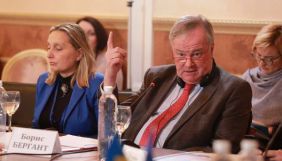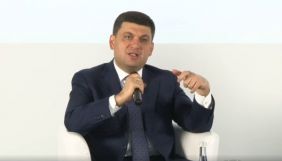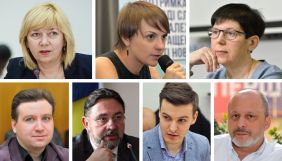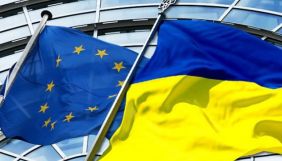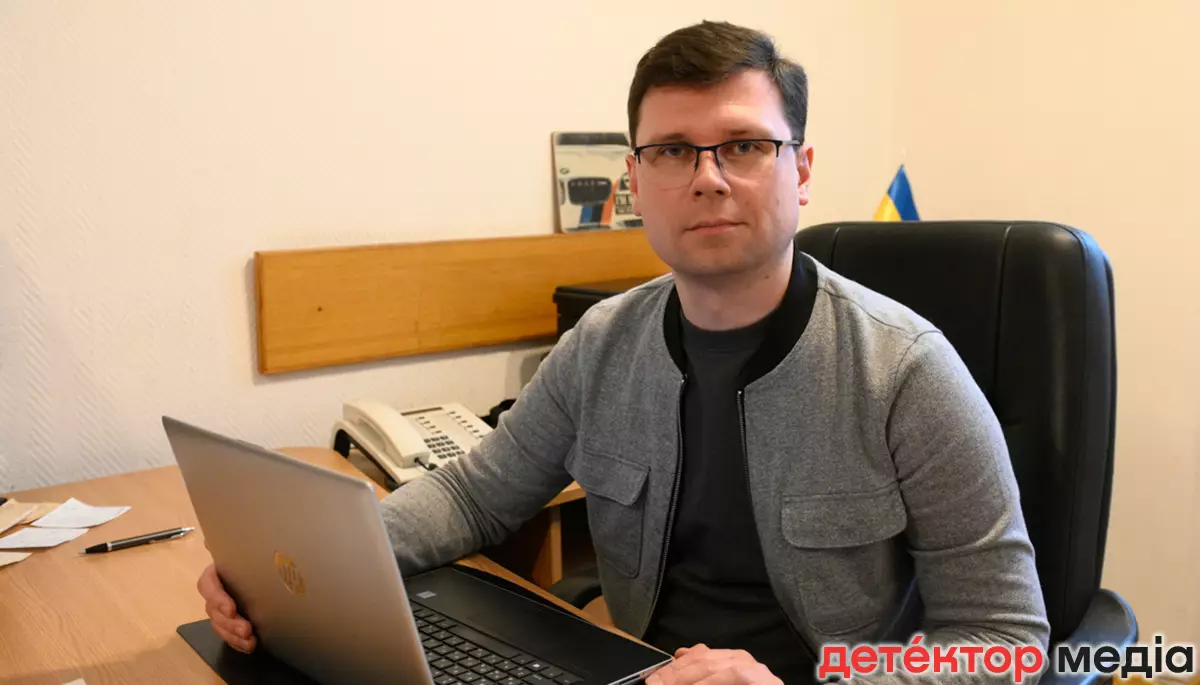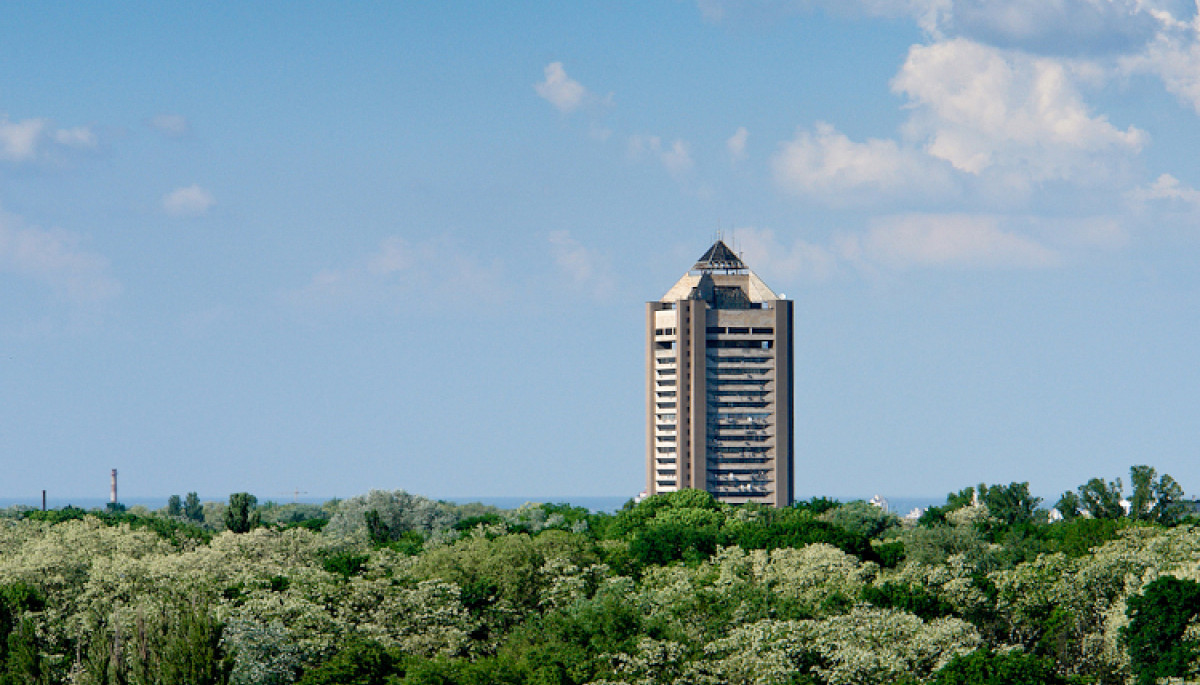
UA: PBC is not only UA: PERSHYI. We explain it in terms of facts and figures
UA: PBC is not only UA: PERSHYI. We explain it in terms of facts and figures
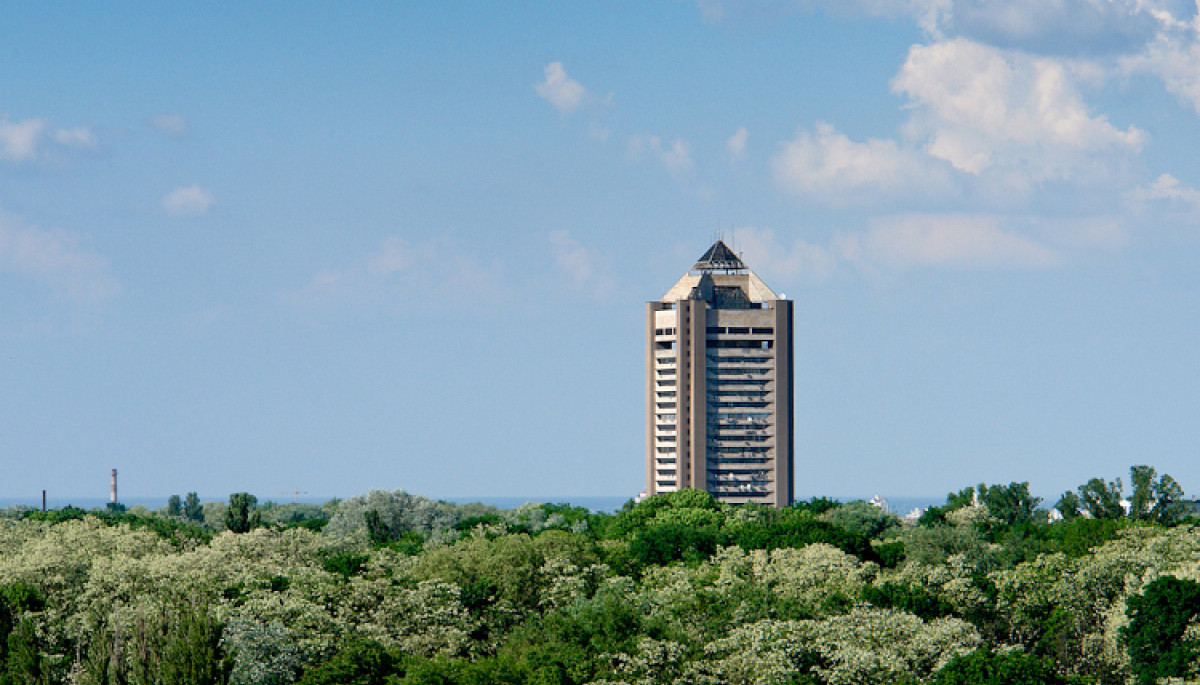

Українською читайте тут.
There has been a lot of distorted information or outright fakes around UA: PBC lately. Someone attribute these information attacks to the approaching adoption of the State Budget, which funds Public Broadcasting Company. Someone considers it to be an attack on independence and attempts by the authorities to take control of UA: PBC. It is difficult to contain in one text everything that has been done over four years of reform. But here are the most important figures that may dispel the manipulations around the reform they are trying to downplay.
UA: PBC is not one channel. What is UA: PBC?
UA: PBC is a large corporation: two nation-wide channels (UA: PERSHYI and UA: KULTURA), three channels of UA: Ukrainian Radio (UR-1, UA: Radio Promin and UA: Radio Kultura), 23 regional branches in the regions and UA: KRYM, a quite powerful digital platform, orchestra, ensembles, choir and the Recording House. You can see and read about these assets on a corporate website corp.suspilne.media. UA: PBC has the largest coverage among all Ukrainian broadcasters.
Thanks to the Revolution of Dignity, the Law of Ukraine “On Public Service Television and Radio Broadcasting” was finally adopted, and a few years later, in January 2017, the joint stock company “Public Broadcasting Company” (JSC “UA: PBC”) was established on the basis of the state TV and radio channels. The company inherited mostly unrepaired premises, undocumented land and buildings, obsolete equipment and far too large staff (a total of 7,500 employees). The total area of buildings and structures in the authorized capital of JSC “UA: PBC” is 208,065 sq. m; under economic management there are 7,824 sq. m. The total area of land plots is 34.6 hectares. The total number of full-time positions as of October 2021 is 4,148. More than three thousand employees were laid off in spring 2018, and another three hundred in 2020. It was a painful process of transformation.
Why don't you get rid of extra assets? Why spend money on the maintenance of old premises that you do not use?
According to the law, UA: PBC is an object of nation-wide importance. Alienation, transfer (except for short-term lease), privatization of real estate, unfinished construction objects, land plots on which they are located, as well as shares owned by the state in the authorized capital of UA: PBC, are prohibited by the law. To get rid of "extra" property, you need to go through a chain that starts from initiating amendments to the law to their adoption, and then approval by all institutions, including the company's shareholder, the State Committee for Television and Radio Broadcasting of Ukraine, and the founder, the Cabinet of Ministers of Ukraine. It is worth mentioning here that these government bodies cannot interfere with the company's editorial policy: this is not part of their clearly defined powers of which there are quite a few.
How is the Company different from hundreds of commercial broadcasters in Ukraine and several state broadcasters (Rada, UATV and Dom)?
UA: PBC is the largest independent media corporation in the country. UA: PBC does not depend on oligarchs or politicians, does not serve the interests of business structures and authorities. UA: PBC belongs to people and cares primarily for their interests. Neither commercial channel will broadcast a concert of classical music because it will be watched by a very small audience. This is unprofitable for commercial channels. And UA: PBC will broadcast because it must promote the interests of even the smallest groups of the population. The purpose of a commercial broadcaster is to bring profit to the owner and work for his interests, a state broadcaster is aimed at working in the interests of the authorities because they determines de facto "state interest" through control over state institutions. The purpose of UA: PBC is to work for people guiding by transparent rules of editorial policy, under the control of the Supervisory Board whose members are elected by public organizations and parliamentary factions.
If UA: PBC had been created in 1997, when the first law was drafted, and it had been given freedom of action and appropriate budget support back then, the market situation would have been different now. UA: PBC would have been stronger, would have had a larger audience. But UA: PBC was created in 2017. Several powerful commercial media groups owned by oligarchs have been created during these twenty years. Of course, the presence of an independent unbiased media outlet is not favourable for them. Leaders of commercial channels now often devalue the reform claiming that their channels perform public broadcaster functions, and ask the authorities not to give money to UA: PBC.
President Volodymyr Zelensky called UA: PERSHYI a "state" channel. It is so?
UA: PBC is a public service broadcaster. Ukrainian law does not provide for a "public service" form of ownership. Therefore, the law stipulates that 100% of JSC “UA: PBC” shares belong to the state, and they, as well as the property, cannot be sold. But state bodies do not manage UA: PBC. The company's management is now elected by an independent Supervisory Board every four years. Public authorities do not determine editorial policy nor do they have the right to interfere with the current economic activities.
UA: PBC is financed from the State Budget so is it still a state channel?
We repeat, UA: PBC is not one TV channel. Thus, according to the law, UA: PBC’s funding should not be less than 0.2% of the general fund of the State Budget for the previous year. The draft State Budget for 2022 after the first reading provides for 76% of this figure. In 2021, UA: PBC was allocated UAH 2,2 billion from the State Budget. UAH 1,874,158 were allocated from the general fund for UA: PBC, and UAH 400 million were planned in a special fund which is filled with taxes from the lottery business. It is still unknown whether the company will receive these 400 million till the end of the year. So far, we have received a bit more than 60 million.
It is still impossible to finance such a large company in any other way. Yes, it is financed from the State Budget, but this does not mean that it is essentially state (or pro-government). First of all, it has a different mission. Adherence to the mission is guaranteed by the Supervisory Board, which is appointed and acts in a manner independent of government decisions, and it resolves key strategic matters of the company – from the election of executive management to the approval of annual plans and acceptance of audit results.
Although the Public Broadcasting Company has a formula written in the relevant law, according to which its annual funding should be calculated (0.2% of the general fund of the State Budget for the previous year), in practice this norm has never been fulfilled. But nobody is responsible for this because a "permission" to violate this rule was written down in the Budget Code. To solve this problem, Ukrainian experts and experts of the Council of Europe proposed a new model of UA: PBC financing: to write in the Budget Code the formula of UA: PBC funding through a special fund of the State Budget that will be filled by rent for the use of radio frequency resource paid by broadcasters and cellular operators and which does not have a target recipient. Despite the promises of the new government, the movement towards a new funding model is frozen.
How much money is spent on UA: PERSHYI?
Almost UAH 450 million are spent on television (UA: PERSHYI, UA: KULTURA, UA: KRYM and UA: KYIV). Of these, 25 million were spent to this year's Olympics, 50 million to purchase serial content (with short rights).
As you can see, the statement that UAH 2 billion is spent on UA: PERSHYI is wrong. The rest of the money is used to support regional branches, as well as radio broadcasting, digital platforms, security services, administrative and general production costs. Each branch receives from 14.6 million (Ivano-Frankivsk) to 32.6 million (UA: DONBAS), a total of UAH 600 million.
And another interesting aspect. Oligarchs probably give all the money planned for the year to their TV channels at the beginning of the year in January, but this is not the case with state funding. UA: PBC did not receive two billion in January 2021. To be more precise, in January it received UAH 119.5 million, in February - UAH 119.5 million , in March – UAH 118.4 million , in April – UAH 108.3 million, in May – UAH 102.2 million, in June – UAH 105 million, in July – UAH 99.8 million, in August – UAH 108 million, in September – UAH 114.7 million, in October - UAH 130.7 million. As of October, UAH 61.7 million came from the special fund. That is the fund with the UAH 400 million that are for the development expenditures. UAH 3.3 million of that money were spent to equipment; UAH 41.2 million were used to acquire football rights; UAH 17.2 million are the balance on the account (football reserve).
The company now operates within one year. And every year on December 31, all the money available on the accounts is taken to the State Budget, and not transferred to the next year. We do not have the conditions for longstanding production of films and series. And normal television does not exist without it. Who knows better than a large number of TV and film producers in power?
Other channels can do more for UAH 2 billion.
UA: PERSHYI can also do much more if it is given UAH 2 billion!
Authorities, especially those who have had experience working for oligarchic channels in the past, have repeatedly argued that commercial channels have a higher rating for much less money. Less money? Really? And what do you think, for example, this news: "Akhmetov has invested $ 560 million in his Media Group." USD 560 million is more than UAH 15 billion! Of course, one can produce/purchase expensive content and raise ratings with this amount.
How much commercial money does UA: PBC have for 2021 and where is it spent?
UAH 73.9 million is planned, of which UAH 44.6 million come from advertising, 26.7 million are from rent. UAH 56.2 million (101% of the plan) has already been received in three quarters. According to the law, advertising volumes must decrease every year; this norm was lobbied by the commercial broadcasters who said that if UA: PBC received money from the State Budget, then it should not make claim to advertising money.
How much do the rights to the Olympic Games and football cost?
The cost of the license to show the Olympic Games (2022 Winter Olympics and 2024 Summer Olympics) is three million dollars. USD 1 847 74 need to be paid for the 2022 Winter Olympics this year (until November 15, 2021). For the 2024 Summer Olympics we need to pay off in 2022 and 2023. About half a million dollars is needed additionally for technical services for each Olympic Games.
Moreover, according to a long-standing agreement that was signed by the State Television Company, UA: PBC must pay for the rights to broadcast the FIFA World Cup Qatar 2022. This is a large amount (commercial secret) + technical services. So far, the cost of the rights has been paid partially. As a reminder, according to the agreement, Rinat Akhmetov's Media Holding "Ukraine" has the right to buy out half of the rights for broadcasting, but only after UA: PBC has paid its share.
Switching to pay grading system. Is it true that the management receives salaries from three to six million?
No, not true. The transition to pay grading system that defines the amount of pay for employees began in 2021. So far, there are 2,832 positions for whom the salaries were increased in UA: PBC, including 1,421 positions in the Central Directorate and 1,411 in the branches. Another 250 positions have not received an increase yet. The rest of the positions were within the offered range. The salaries of the management will be the last to be graded till the end of this year.
Most of manipulations in the media concerned the salaries of the management. In particular, some claimed that the Head of the Managing Board received six million UAH per year. In fact, according to the Agreeement (before the switch to pay grading system) the Head of the Managing Board has a monthly salary of UAH 118 000, while the members of the Managing Board get UAH 98 000. Both the Head and the members of the Managing Board will receive UAH 180 000 as of November, 1. Besides, the pay grading system provides for the possibility of quarterly bonuses (except for the Head and the members of the Managing Board). The Supervisory Board may give an annual bonus (up to six salaries) to the Head and the members of the Managing Board, but only after assessing their work for the year. Have you ever wondered how much the management of large commercial media outlets with fewer employees is paid? These sums are substantially higher than the ones UA: PBC management has.
Members of the Supervisory Board don't get paid at all. In accordance with the law, we work free of charge.
Why doesn't the company pay financial aid?
It does. In particular, we paid UAH 1 766 314 in 2021, and by the end of the year this figure will have increased. The money is paid for the birth of children, in connection with the death of family members or for medical treatment.
It it true that UA: PBC inherited 400 years of unused vacations?
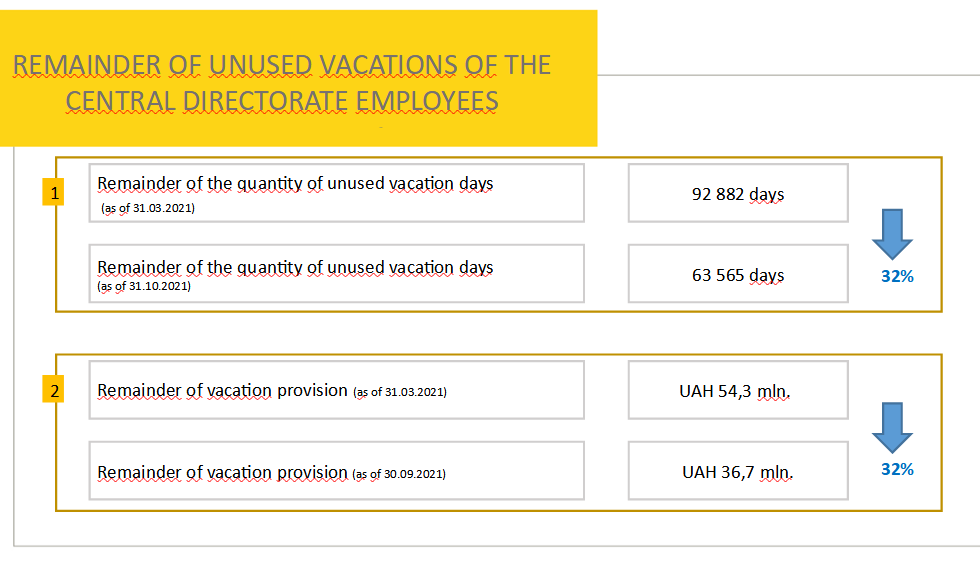 It is true. And that was a great challenge in the course of transition to the pay grading system. People were persuaded to take vacations so that the index would decrease. As of the end of October, there were two employees with 400+ days of unused vacation and three employees who have from 300 to 399 days.
It is true. And that was a great challenge in the course of transition to the pay grading system. People were persuaded to take vacations so that the index would decrease. As of the end of October, there were two employees with 400+ days of unused vacation and three employees who have from 300 to 399 days.
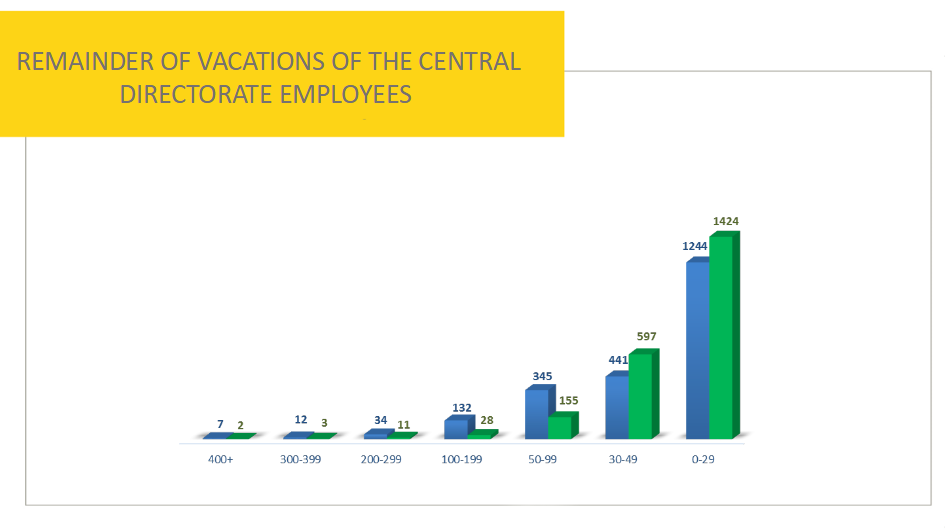
Where is the new UA: PBC content?
New content is available on TV channels, radio, and UA: PBC digital platform. In 2021, 134 new projects were launched: 22 on television, 15 on radio, 73 on the air of the regional branches and newsrooms for national minorities; 15 on the digital platform. Several other important premieres will take place in the near future.
In August, to the thirtieth anniversary of Declaration of Independence of Ukraine, a grand premiere of the documentary series The Collapse. How Ukrainians Destroyed the Evil Empire was held. Also, Prozoro: Pro Aktualne (Transparent: About the Current News), Prozoro: Pro Holovne (Transparent: About the Main News), Poliusy (Poles), social talk show Po-liudsky (Humane way) were launched on UA: PERSHYI.
Suspilne Podcasts, YouTube channel Suspilne Kraina (Supilne Country) and YouTube channel for children Brobaks where the youngest viewers can watch cartoons that are produced by UA: PBC.
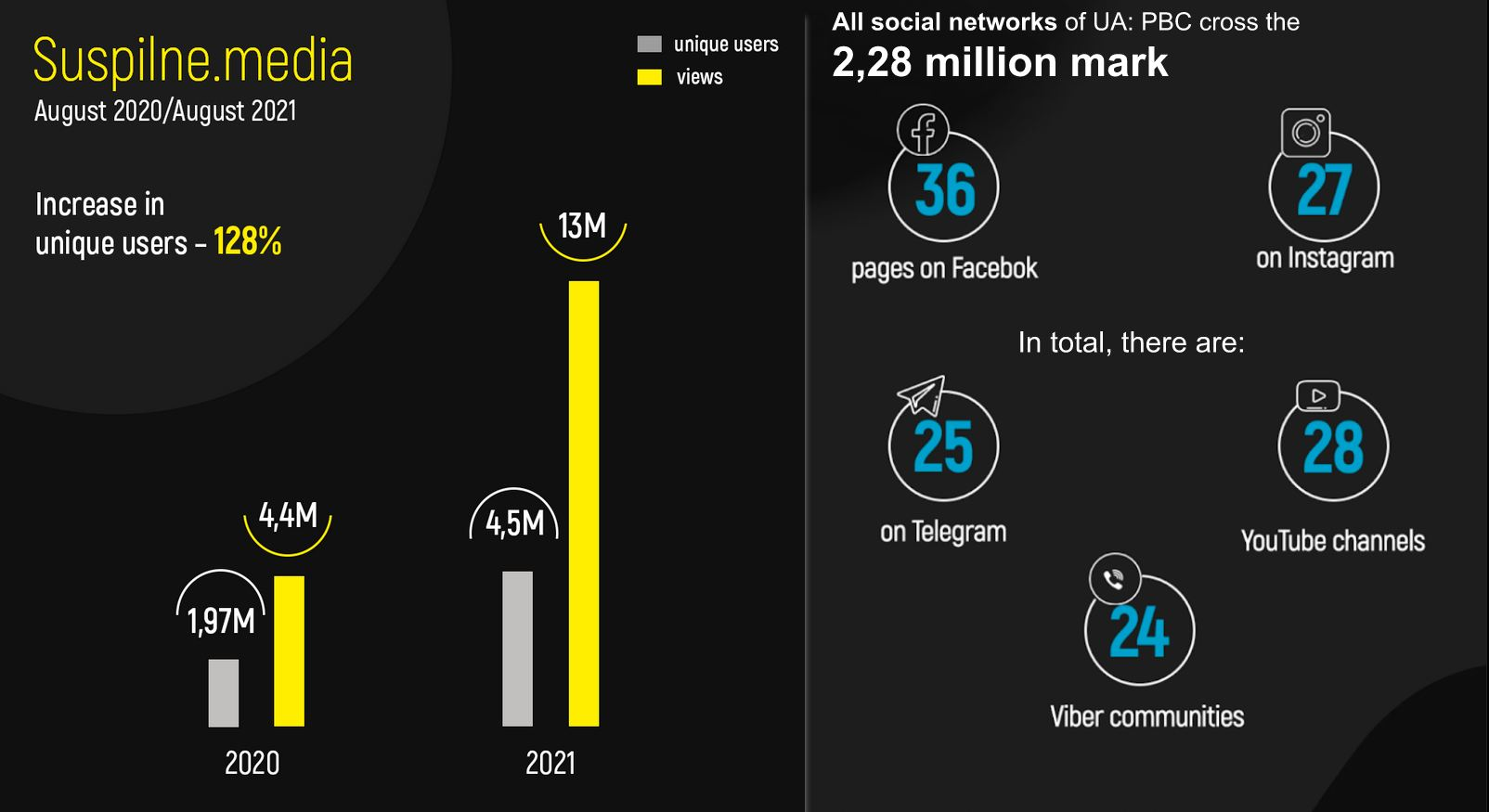
Suspilne Sport is one year old. It was of great help to UA: PERSHYI in the course of the Summer Olympic Games.
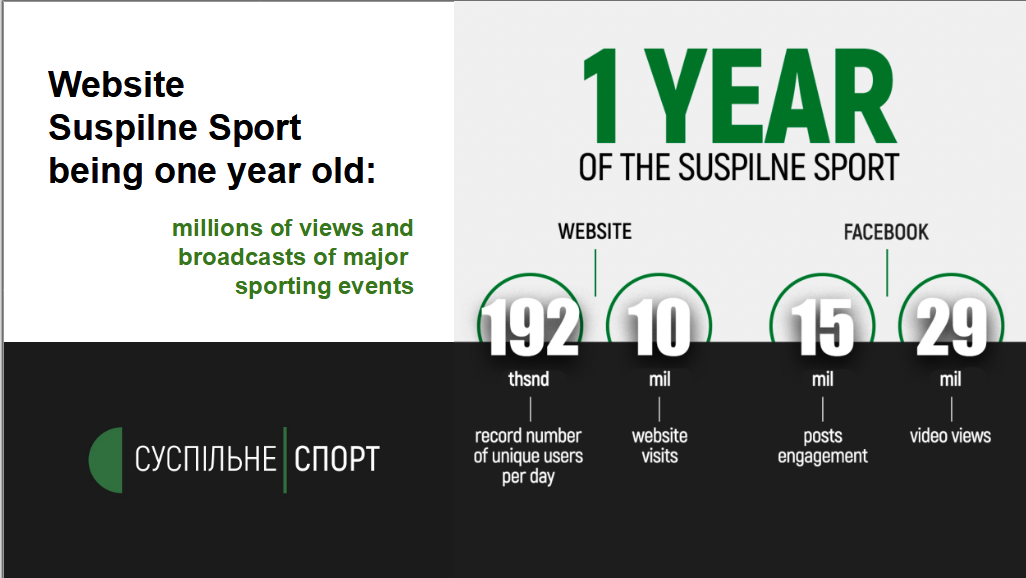
60 projects have been produced within the Create with Suspilne programme and they are broadcast on regional branches. UA: PBC is gaining more and more experience with pitching. If the law is amended to allow co-productions without obstacles, UA: PBC will be ready to hold pitching sessions for big productions. And it will be done in a transparent manner.
In addition, UA: PBC has signed and executed 175 partnership and cooperation agreements (information partnership). 104 of them were in UA: PBC regional branches; 71 were at UA: PBC Central Directorate (an average of 7 agreements per month). In particular, UA: PBC broadcast the second forum of the Ukrainian World Congress, the summit of the Crimean Platform, the Independence Day parade, the International Mayors Summit, dozens of festivals and forums, etc.
Where are the ratings?
The ratings of the state-owned UT-1 and then of the First National Channel in the last decade and a half were not high, since the channel could not compete with the expensive content of commercial TV groups. UA: PBC TV channel UA: PERSHYI also inherited the audience dominated by older people. Young audiences have moved to digital, and linear television is doomed to lose its audience.
After almost all the old projects disappeared on UA: PERSHYI and the new ones could not be developed because of underfunding in the first years of existence, the channel's rating dropped. Now it is the only TV channel in the Corporation that is officially measured on a daily basis in the Nielsen commercial panel (although it is not aimed at making profit). After combining the regional branches into one technical channel, it is possible to get monthly ratings for the branches. And if you add the radio and digital platforms, the total audience of UA: PBC (excluding social networks) is thirteen million people. Therefore, the rating of just UA: PERSHYI is not an adequate assessment of the effectiveness of the Company. Although, against all odds the Supervisory Board tasks the Managing Board to increase the ratings of UA: PERSHYI and UA: KULTURA for the second year in a row. And these ratings are gradually increasing.
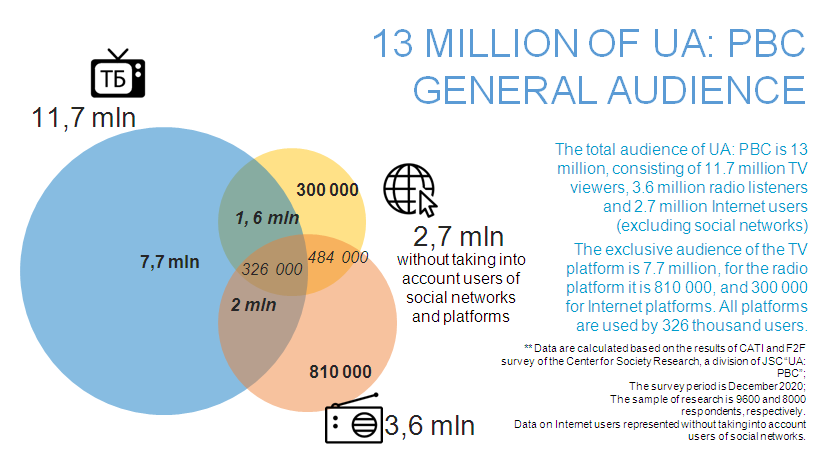
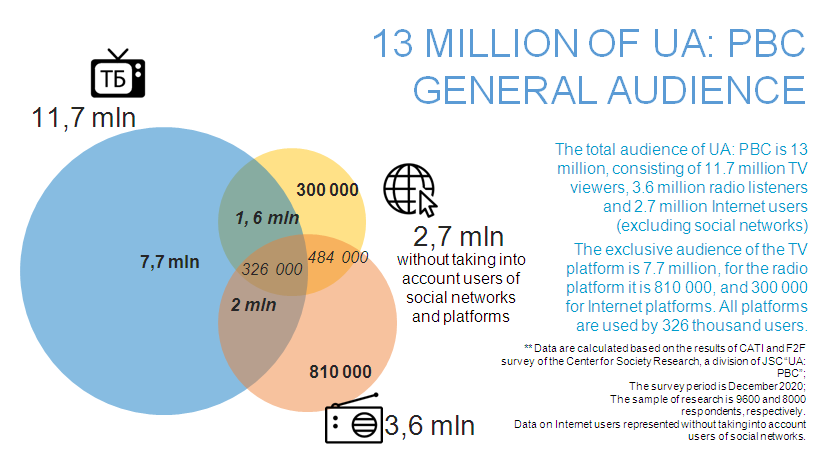
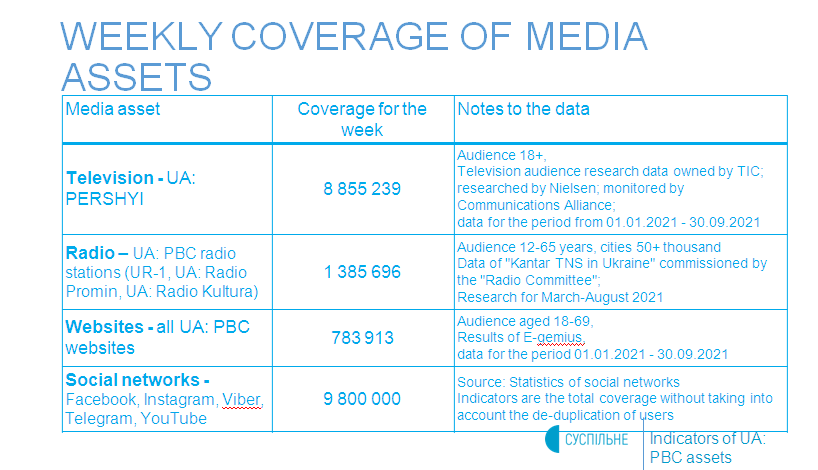
Is UA: Ukrainian Radio public service broadcasting?
Obviously, critics of UA: PBC know that UA: Ukrainian Radio, the most popular talk radio in the country, is also part of UA: PBC.
When UA: Ukrainian Radio was state-owned it couldn't get FM frequencies, and wired radio was declining at a rapid pace. If up to five million listeners had a wired broadcasting in the early 2000s, there was a million in 2015, and 300 000 in 2017. After joining with UA: PBC, our radio staff reformed the content and achieved leadership in the news radio segment. And later they got nation-wide FM-networks for three radio channels. Many thanks to the National Council of Television and Radio Broadcasting of Ukraine for this. At present there are more than three million listeners of UA: Ukrainian Radio on FM, 200 000 listeners on the Internet. Also, public service stations are available in the digital radio air but so far only in Kyiv, where there are thirty thousand digital receivers, of which twenty thousand are built into new cars.
In addition, according to the data of the National Council of Television and Radio Broadcasting of Ukraine, UA: Ukrainian Radio is the leader in the amount of Ukrainian-language content.
Investigative journalism on UA: PBC constantly “lash out at the authorities”.
The same was said both about Poroshenko and Zelensky. This is not true. Firstly, they do not lash out, and secondly, the investigation is not only about authorities. The teams of Investigations.info, Schemes (Radio Svoboda (Radio Libberty)), Our Money with Denis Bihus programmes as well as UA: PBC Journalism Investigations CU make programmes and investigative films about corruption of the state and local authorities, representatives of the opposition, doctors, notaries, etc. UA: PBC produced eight such films in two years.
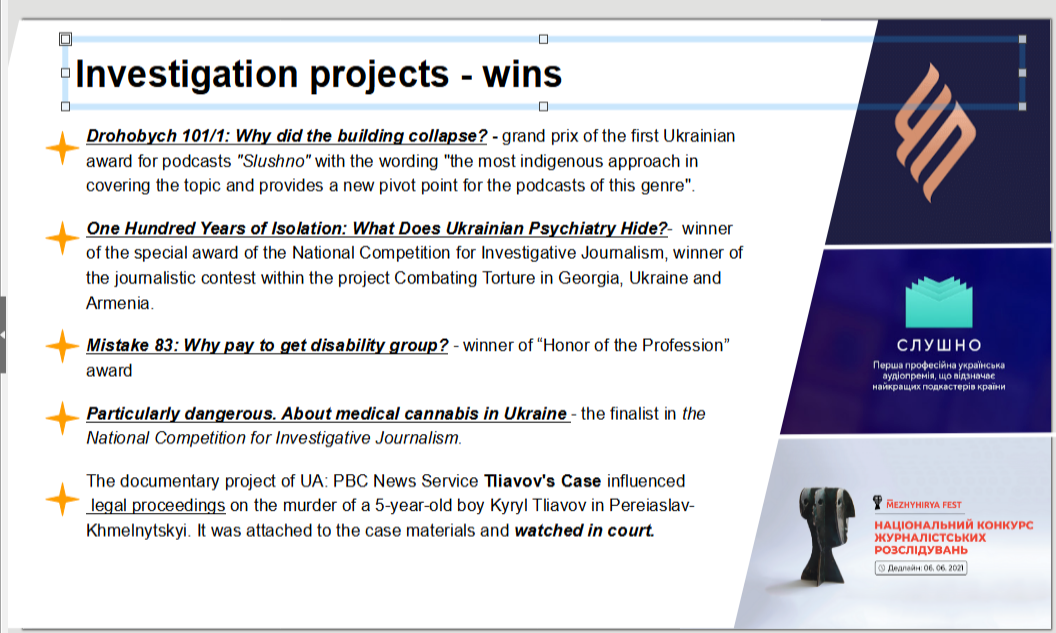
Why don't you talk about your accomplishments?
We do, but not everyone wants to hear about them. Until March 2020, the Company was not allowed to spend the budget money for promotional campaigns at all.
This year, UA: PBC started creating a hyperlocal correspondent network in Chernihiv, Sumy and Kharkiv regions. Suspilne Studio in five locations was launched. A number of programmes and news are now broadcast from it. A grand, combined convergent Newshouse on 26, Khreshchatyk is to be launched in November.

Last year, UA: PBC paid debts that dated back to the days of the State Television (in particular, the oldest: a 24-year old debt on the credit granted by Japan, a 10-year old debt to Euronews for UAH 360 million), and this year it paid more than 10 million debts for the past year.
This year, UA: PBC received a positive, without objections audit conclusion on the financial statements for 2020. The company has introduced an electronic document management and 11 automated modules BAS ERP (personnel and timekeeping; indexing of payroll; military accounting, payroll, etc.). In order to transform from a state to a public service company, the new team had to gradually change all the obsolete procedures, and to do this it developed and adopted more than a hundred new documents and policies. A number of staff functions were outsourced: cleaning services, transportation, security, makeup, sign language interpretation in the regions, etc.
UA: PBC had a number of problems in its early years. It was under-budgeted, and the reform was devalued by the politicians who impacted its reputation instead of supporting. We do not fit into their system of coordinates, so they exercise pressure and criticize unfairly. The first Head of the Managing Board of UA: PBC, Zurab Alasaniia, brought together all the former regional state-owned broadcasters and production companies, built the vertical, eliminated the “telephone justice” and made the company independent. At present, Mykola Chernotytskyi is beginning to synchronize UA: PBC reforms with the decentralization reform and develop the Company.
One of the principles of UA: PBC activity, stated in the law, is the priority of public service interests over commercial and political ones. We have to defend it almost every day. The Company was able to prove its independence to the previous authorities; unfortunately, the current government cannot realize it yet.




















































